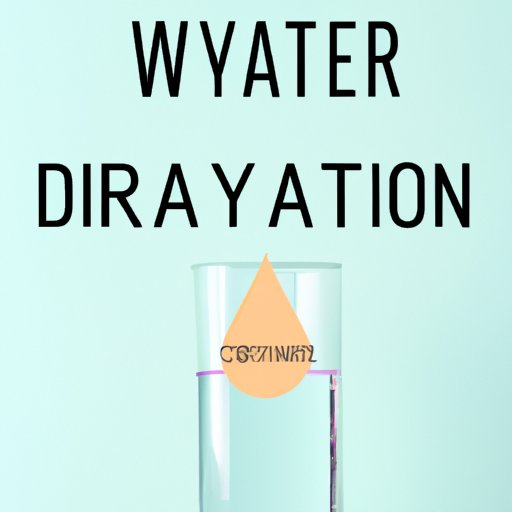
I. Introduction
Water is essential for our survival and maintaining good health. It plays a crucial role in regulating body temperature, aiding digestion, and transporting nutrients. However, many people fail to consume enough water each day, which can have detrimental effects on their health and well-being. In this article, we will explore what happens when you don’t drink enough water, the signs of dehydration, the dangers of prolonged dehydration, common mistakes that contribute to dehydration, and tips for staying hydrated.
II. Importance of Hydration
Water is the most abundant substance in the human body, making up about 60% of our total body weight. This essential fluid serves a number of vital functions, such as lubricating joints, cushioning organs, and flushing toxins from the body. Additionally, water helps regulate body temperature and prevent overheating during physical activity or exposure to hot temperatures. It is also necessary for proper digestion, as it helps the body break down food and absorb nutrients.
It is crucial for people to stay hydrated in order to maintain optimal health. When we do not replenish the fluids that we lose through sweat, urine, and other bodily functions, our body becomes dehydrated, and we can experience a range of negative symptoms and health effects.
III. Signs of Dehydration
The signs of dehydration can range from mild to severe, depending on the severity and duration of the condition. Mild dehydration can cause:
- Thirst
- Dry mouth
- Fatigue
- Headaches
- Dizziness or lightheadedness
If dehydration becomes more severe, symptoms may escalate to include:
- Dark yellow or strong-smelling urine
- Dry or cracked skin
- Inability to sweat
- Rapid heartbeat
- Difficulty breathing
- Sunken eyes or a dry mouth and tongue
IV. Common Mistakes That Contribute to Dehydration
There are several common habits and lifestyle factors that can interfere with people’s ability to stay properly hydrated. Some of these may include:
- Drinking too much caffeine or alcohol, which can cause dehydration
- Being too busy to drink regularly throughout the day
- Not prioritizing water intake in one’s daily routine
- Eating too many salty or processed foods, which can increase the body’s need for water
- Exercising or engaging in physical activity without drinking enough fluids to replenish lost water
- Living in a hot or dry climate without taking adequate measures to stay hydrated
V. The Dangers of Prolonged Dehydration
If dehydration is left untreated, it can lead to a number of serious health issues over time. For example, prolonged dehydration can cause kidney stones, urinary tract infections, and chronic kidney disease. Additionally, dehydration can exacerbate existing health conditions in some individuals, such as diabetes, high blood pressure, and heart disease.
VI. Tips for Staying Hydrated
Fortunately, there are many simple and practical ways to increase one’s daily water intake and stay hydrated. Here are some tips:
- Carry a refillable water bottle with you throughout the day
- Set reminders on your phone or computer to drink water regularly
- Eat more foods with high water content, such as fruits and vegetables
- Drink water before, during, and after exercise or physical activity
- Avoid drinking too much caffeine or alcohol, as these can cause dehydration
- Add natural flavorings to your water, such as lemon or cucumber, to make it more enjoyable to drink
VII. Conclusion
Staying hydrated is essential for maintaining good health and well-being. When we do not drink enough water, our bodies can become dehydrated, which can lead to a range of negative symptoms and health effects. Fortunately, with a few simple lifestyle changes, such as drinking more water throughout the day and eating foods with high water content, we can easily maintain optimal hydration levels. By prioritizing hydration, we can take an important step towards living a healthy, happy life.




